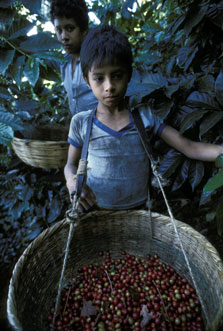The past couple of years, the Fair Trade coffee movement has started to come in for its share of criticism. Whilst Starbucks has slowly bought more certified Fair Trade coffee, it represents only a very small percentage of their total coffee (3.7%). Starbucks rarely offers certified Fair Trade coffee as their coffee of the day, nor has it followed its own policy of brewing Fair Trade coffee, on demand.According to OCA (Organic Consumers Association), many customers mistakenly assume that all Starbucks coffee is fair-traded, but in fact, just 6% of the company's coffee is certified as 'fair-trade'.
While Starbucks only buys about 1% of its coffee with the fair trade coffee label, its sales make up more than 10% of the global fair trade coffee market. At the same time, Starbucks contends, their CAFE program means that they actually pay higher than fair trade coffee prices for a great deal of their coffee. (source: http://www.talkaboutcoffee.com/fair-trade-coffee-more-than-higher-prices.html)Sources:
Starbucks Fair Trade Campaign
Organic Consumers Association : Starbucks
www.beanactivist.wordpress.com

